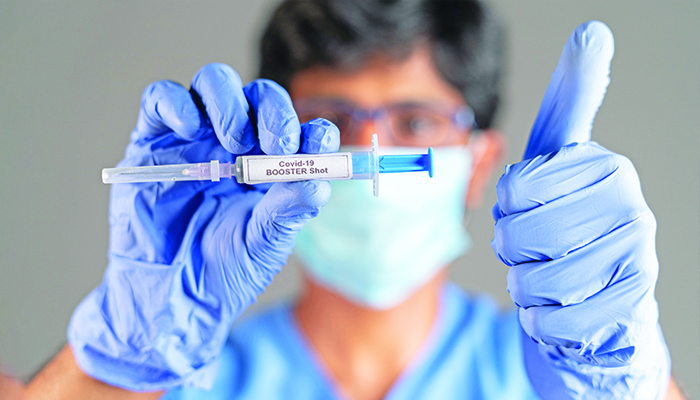
Muscat: More than half a million people in Oman have been administered booster doses to protect them against infection from COVID-19, reveal figures released by the Ministry of Health.
507,440 people among those eligible had been given booster doses until 9 February, 2022. Of them, 144,198 are Omani nationals and the remaining 363,242 are expatriates. “I think there is more demand among expatriates to get third/ booster doses because it is considered a requirement as part of procedures for travel to other countries,” said Ibrahim Al Maimani, a data analyst in the country.
As part of the country’s national immunisation campaign against COVID-19, 6,676,224 doses have been administered to eligible people. 3,191,912 first doses, 2,976,872 second doses, and 507,440 boosters have been used to inoculate the population.
1,770,692 Omanis and 1,420,950 expatriates have been vaccinated with at least one dose of COVID-19 vaccines and 1,665,562 Omanis and 1,311,310 expatriates have been jabbed with at least two doses. However, Al Maimani revealed that about 160,000 people in the country are yet to be vaccinated with even the first dose. “There are also some 215,000 people who have been administered the first dose, but have not taken the second yet,” he added.
In this context, Dr Jean Jabbour, the representative of the World Health Organisation to Oman, explained that vaccines are still the best way to prevent the virus from spreading and replicating to form potentially harmful strains of the coronavirus.
“For pharmaceutical or medical interventions, vaccines are most important,” he said, speaking to TTV. “This resulted in either the elimination or eradication of viruses, bacteria and other microbes that caused infection. Vaccinations are an important public health measure that is important to cut the transmission of the coronavirus.”
Jabbour also addressed the concerns of those who believed rumours and misinformation against vaccines that are sometimes circulated on social media.
“On social media, you have a lot of information, but not all this information is correct or based on scientific evidence,” he explained. “Vaccines are safe, effective, are the most important measures to stop the pandemic. When I hear such things among the population, I sometimes go into discussions with them and I tell them that it is better to have something that is planned, scientific and to understand its impact on the community.”
He added: “We ask people to follow government policy, listen to them and see what recommendations they issue. Why would you go and listen to other sources? Why would you listen to other policies? Every country has its own specific context. This is why you need to understand your government policy, and thank God their policies are moving on the right track and progressing very well.”
“The more coverage we have, the more hope we have. All countries should have high coverage rates of vaccination to stop the transmission rates of the pandemic.”
Governorates across Oman continue to encourage people to get vaccinated through initiatives run at local level. In Al Buraimi, where vaccination programmes continue to run strong, there are only seven patients admitted to hospital because of COVID, of whom four are in intensive care.
“Vaccinations contributed to a decrease in infection rates, as those who are vaccinated suffer only mild symptoms of the disease,” said Hamad bin Salem Al Alawi of the office of the Director General of Health Services in Al Buraimi.
“During the previous wave, the admission rates for unvaccinated people to intensive care was very large,” he added. “I stress once again the importance of getting vaccinated with the booster dose, as this will contribute to a decrease in infection rates and the number of inpatients in hospitals, as well as relieve pressure on the nation’s health sector.”